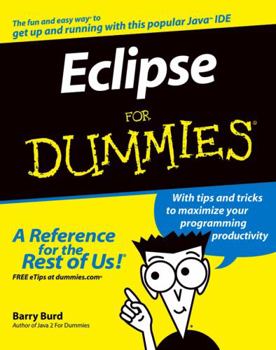Eclipse for Dummies
Select Format
Select Condition 
Book Overview
In his friendly, easy-to-understand style, the bestselling author of Java 2 For Dummies shows developers how to get up to speed fast on this popular Java IDE Eclipse, an open source product originally developed by IBM, has an estimated 500,000 users-a 45 percent market share among Java IDEs Shows Java developers how to maximize programming productivity with Eclipse, covering all the basics as well as advanced techniques such as using Ant, developing new Eclipse plug-ins, and working with Javadocs JAR files
Format:Paperback
Language:English
ISBN:0764574701
ISBN13:9780764574702
Release Date:December 2004
Publisher:Wiley Publishing
Length:346 Pages
Weight:1.24 lbs.
Dimensions:0.8" x 7.3" x 9.3"
Customer Reviews
4 ratings
Good to begin with
Published by Thriftbooks.com User , 16 years ago
Important Eclipse features are explained , in plain language. First time I see text where someone said in plain English what is JAR, Plug In and so on further. YOU HAVE TO KNOW JAVA BEFORE READING THIS (it's something you know already, I guess).
Great Eclispe IDE Reference
Published by Thriftbooks.com User , 17 years ago
This book provided lots of useful tips and information to the inner workings of the Eclispe IDE. Elcipse for Dummies was well compiled and very informative, it also gives the reader much more of an understanding of the very popular Eclispe IDE and how to best utilise it's features.
An Eclipse book for the application programmer.
Published by Thriftbooks.com User , 18 years ago
I bought this book because it's purpose is to teach the use of Eclipse for the sake of using Eclipse. That is as opposed to using Eclipse to enhance Eclipse, ie, writing plugins. It did an admirable job of achieving that purpose. The writing style is relaxed and intended to be conversational. Eclipse for Dummies is about 335 pages in length. The book has four major sections, each section containing one or more chapters for a grand total of 18 chapters. Section 1 is the basic introduction to Eclipse and covers installing and understanding the conceptual design of Eclipse. There is a good discussion of perspectives, views, and the difference of the two. Java programming examples are presented at each step and I would stronly encourage the reader to replicate the examples themselves. If you skip the implementing the examples, your going to get a lot less from the book. This goes for entirety of the book. Section 2 comprising chapters 6-12, goes into greater depth in discussing the features of the Eclipse programming environment. This is where the tricks of the trade are focused on, for example, using the Java editor, code assist, documentation,and formatting helps. Refactoring is heavily discussed as it probably should be. Section 3 comprising chapters 13-16 discusses working with projects, running the code, and debugging. Now personally, I would have thought that should have been up front, however, given the number of programming examples laced throughout the earlier chapters the reader is kind of already given a good introduction to creating and maintaining multiple source files and packages within a project. Section 4 is just a little add-on kind of thing which discusses the ten most FAQs and suggestions for what plugins you might want to add. I gave the book four stars, but really I would have given it a 3.75. I looked around a lot for Eclipse tutorial books, but found that they moved too fast, assummed too much on the part of the reader, and apparently assumed the reader wanted to join the Eclipse team. Eclipse for Dummies was the best book I have found so far for the typical programmer who wants to use Eclipse for the sake of creating applications.
Good treatment of Eclipse with a minor caveat...
Published by Thriftbooks.com User , 20 years ago
Another one of the newer books out on Eclipse is Eclipse For Dummies by Barry Burd (Wiley). I like the book for what it is, but there are some caveats that may affect your experience... Chapter List: Part 1 - The Eclipse Landscape: Reader, Meet Eclipse, Eclipse, Meet The Reader; Installing Eclipse; Using the Eclipse Workbench; Changing Your Perspective; Some Useful Perspectives and Views Part 2 - Using the Eclipse Environment: Using the Java Editor; Getting Eclipse to Write Your Code; Straight from the Source's Mouse; More Eclipse "Sourcery"; Refactoring: A Burd's Eye View; Refactor This!; Looking for Things in All the Right Places Part 3 - Doing More With Eclipse: Working with Projects; Running Code; Getting Help; Squashing Bugs Part 4 - The Part of Tens: The Frequently Asked Questions (And Their Answers); Ten Great Plug-ins for Eclipse Index First off, what I liked... I'm unapologetic in my liking of Dummies titles. They mesh well with my learning style (light and humorous), and I think they do a great job in giving one a good understanding of a particular subject. If you had never read anything about Eclipse, this book would be a good way to expose you to the functionality of the software. I also like how Burd covers the features of the software, like refactoring and such. Once again, when you get done with the book, you should understand how the software can help you when you're coding your programs. Finally, it's been published since Eclipse 3 was released, so it's dealing with the latest and greatest. So what are the caveats? The book deals mostly with the Eclipse as an IDE, but not so much with actual coding with it. There are other books out there that largely cover the same material as this book does, but they have more of an emphasis on actual coding examples. Having the practical coding examples can help cement some of the learning you'll need going forward. It's not that this book is bad or that it's done a bad job. It's just that depending on what you're looking for, this may or may not be your best choice...






